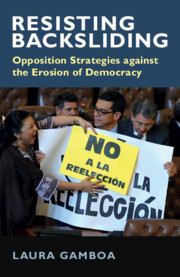Refine search
Actions for selected content:
23 results
The would-be autocrats’ toolkit: what do incumbents do when they undermine democracy?
-
- Journal:
- European Political Science Review , First View
- Published online by Cambridge University Press:
- 04 September 2025, pp. 1-20
-
- Article
-
- You have access
- Open access
- HTML
- Export citation
Catholic churches’ stances toward electoral manipulation in the post-Third Wave period
-
- Journal:
- Politics and Religion , First View
- Published online by Cambridge University Press:
- 06 August 2025, pp. 1-24
-
- Article
-
- You have access
- Open access
- HTML
- Export citation
Visibility of autocratization and election outcomes
-
- Journal:
- European Political Science Review , First View
- Published online by Cambridge University Press:
- 11 June 2025, pp. 1-20
-
- Article
-
- You have access
- Open access
- HTML
- Export citation
The Spillover of the US Capitol Insurrection: Reducing Expressed Support for Domestic Far-Right Parties
-
- Journal:
- British Journal of Political Science / Volume 55 / 2025
- Published online by Cambridge University Press:
- 12 February 2025, e12
-
- Article
-
- You have access
- Open access
- HTML
- Export citation
Re-examining democratization's impact on foreign borrowing costs during the first era of globalization
-
- Journal:
- Financial History Review / Volume 31 / Issue 3 / December 2024
- Published online by Cambridge University Press:
- 16 January 2025, pp. 330-346
-
- Article
-
- You have access
- Open access
- HTML
- Export citation
How Much Opposition to Aggrandizers? Explaining Differences in Pushback against Three Philippine Presidents – ADDENDUM
-
- Journal:
- Journal of East Asian Studies / Volume 25 / Issue 1 / March 2025
- Published online by Cambridge University Press:
- 16 January 2025, p. 155
-
- Article
-
- You have access
- Open access
- HTML
- Export citation
How Much Opposition to Aggrandizers? Explaining Differences in Pushback against Three Philippine Presidents
-
- Journal:
- Journal of East Asian Studies / Volume 24 / Issue 2 / July 2024
- Published online by Cambridge University Press:
- 13 December 2024, pp. 145-168
-
- Article
- Export citation
The great convergence: post-Cold War transitions to hybrid regimes across waves and ebbs
-
- Journal:
- Italian Political Science Review / Rivista Italiana di Scienza Politica / Volume 54 / Issue 3 / November 2024
- Published online by Cambridge University Press:
- 05 December 2024, pp. 248-256
- Print publication:
- November 2024
-
- Article
-
- You have access
- Open access
- HTML
- Export citation
Civic Opposition and Democratic Backsliding: Mobilization Dynamics and Rapport with Political Parties
-
- Journal:
- Government and Opposition / Volume 60 / Issue 2 / April 2025
- Published online by Cambridge University Press:
- 27 May 2024, pp. 431-455
-
- Article
-
- You have access
- Open access
- HTML
- Export citation
Religious Institutions’ Stances towards Autocratization in the Post-Third Wave Period
-
- Journal:
- Government and Opposition / Volume 59 / Issue 2 / April 2024
- Published online by Cambridge University Press:
- 31 October 2023, pp. 441-463
-
- Article
- Export citation
10 - Authoritarian Policing and Democratization
- from Part III - Democratic Transition and Authoritarian Resilience
-
-
- Book:
- Regime Type and Beyond
- Published online:
- 25 May 2023
- Print publication:
- 08 June 2023, pp 244-264
-
- Chapter
- Export citation
The Pragmatics of Democratic “Front-Sliding”
-
- Journal:
- Ethics & International Affairs / Volume 36 / Issue 4 / Winter 2022
- Published online by Cambridge University Press:
- 22 December 2022, pp. 437-453
-
- Article
-
- You have access
- Open access
- HTML
- Export citation

Resisting Backsliding
- Opposition Strategies against the Erosion of Democracy
-
- Published online:
- 10 November 2022
- Print publication:
- 03 November 2022
6 - Opposition Strategies Elsewhere
-
- Book:
- Resisting Backsliding
- Published online:
- 10 November 2022
- Print publication:
- 03 November 2022, pp 178-236
-
- Chapter
- Export citation
2 - Opposition Strategies against the Erosion of Democracy
-
- Book:
- Resisting Backsliding
- Published online:
- 10 November 2022
- Print publication:
- 03 November 2022, pp 22-49
-
- Chapter
- Export citation
3 - Electing Leaders with Hegemonic Aspirations
-
- Book:
- Resisting Backsliding
- Published online:
- 10 November 2022
- Print publication:
- 03 November 2022, pp 50-97
-
- Chapter
- Export citation
4 - “Chávez Vete Ya”: The Erosion of Democracy in Venezuela
-
- Book:
- Resisting Backsliding
- Published online:
- 10 November 2022
- Print publication:
- 03 November 2022, pp 98-128
-
- Chapter
- Export citation
5 - Preventing the Erosion of Democracy in Colombia
-
- Book:
- Resisting Backsliding
- Published online:
- 10 November 2022
- Print publication:
- 03 November 2022, pp 129-177
-
- Chapter
- Export citation
1 - Introduction
-
- Book:
- Resisting Backsliding
- Published online:
- 10 November 2022
- Print publication:
- 03 November 2022, pp 1-21
-
- Chapter
- Export citation
Resisting autocratization: the protest–repression nexus in Hong Kong's Anti-ELAB Movement
-
- Journal:
- Japanese Journal of Political Science / Volume 22 / Issue 4 / December 2021
- Published online by Cambridge University Press:
- 03 December 2021, pp. 193-197
-
- Article
- Export citation
